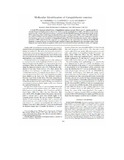Please use this identifier to cite or link to this item:
http://hdl.handle.net/10311/306Full metadata record
| DC Field | Value | Language |
|---|---|---|
| dc.contributor.author | Matsheka, M.I. | |
| dc.contributor.author | Lastovica, A.J. | |
| dc.contributor.author | Elisha, B.G. | |
| dc.date.accessioned | 2009-04-21T10:36:39Z | |
| dc.date.available | 2009-04-21T10:36:39Z | |
| dc.date.issued | 2001 | |
| dc.identifier.citation | Matsheka, M.I et al (2001) Molecular Identification of Campylobacter concisus, Journal of Clinical Microbiology, vol. 39 (10), pp. 3684–3689 | en |
| dc.identifier.issn | 0095-1137 | |
| dc.identifier.uri | http://hdl.handle.net/10311/306 | |
| dc.description.abstract | A 1.6-kb DNA fragment isolated from a Campylobacter concisus genomic library gave C. concisus-specific restriction fragment length patterns when it was used as a probe in hybridization studies. All of the strains tested, including type strains and clinical isolates, contained a 0.5-kb HindIII fragment that hybridized to the probe. DNA sequencing of the 1.6-kb fragment identified three open reading frames (ORFs). One of the ORFs encodes the carboxy terminus of GyrB, and the translational products of ORF2 and ORF3 showed similarity to hypothetical proteins, previously identified in Campylobacter jejuni. DNA-DNA hybridization studies with a fragment internal to ORF3 showed that this sequence was responsible for the signal observed with the 0.5-kb HindIII fragment. A rapid PCR assay was developed and evaluated. Primers that annealed to the extremities of the 1.6-kb fragment were used to obtain an amplicon of the correct size from both reference and clinical strains of C. concisus. | en |
| dc.language.iso | en | en |
| dc.publisher | American Society for Microbiology. http://jcm.asm.org/ | en |
| dc.subject | Campylobacter concisus | en |
| dc.subject | DNA sequencing | en |
| dc.subject | PCR assay | en |
| dc.title | Molecular Identification of Campylobacter concisus | en |
| dc.type | Published Article | en |
| Appears in Collections: | Research articles (Dept of Biological Sciences) | |
Files in This Item:
| File | Description | Size | Format | |
|---|---|---|---|---|
| Molecular identification of.pdf | 4.59 MB | Adobe PDF |  View/Open |
Items in DSpace are protected by copyright, with all rights reserved, unless otherwise indicated.
